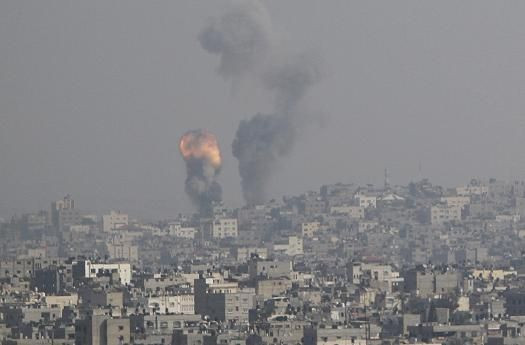Israel, Gaza Barreling Toward Repeat Performance - War
Not since the first weeks of 2009 have tensions between Hamas and Israel been so heated

Nearly four years after a three-week-long armed conflict raged between Israel and Gaza-based Palestinians, it seems the two sides are barreling toward a repeat performance, with their grievances the same as before.
Sporadic but consistent rocket fire targeting Israeli civilians from Arab Hamas militants in their ongoing battle for Palestinian autonomy reached a threshold this week that has incited an overwhelming response from the Israeli military in the past 24 hours. The killing on Wednesday of Hamas military chief Ahmed Jaabari, a key player in the war four years ago, incited an escalation of attacks from Hamas.
Since the start of what Israeli Defense Forces are calling Operation Pillar of Cloud, where air force jets attacked an estimated 20 targets inside Gaza, hundreds of rockets have been lobbed toward Israeli towns, including a long-range Grad rocket that hit an apartment building in Kiryat Malachi, about 17 miles from the northern border of the Gaza Strip, roughly halfway to Tel Aviv, killing three. A school 14 miles west of Gaza and other seemingly random civilian structures were also hit, but no casualties were reported. The Palestinians say at least 13 people have been killed.
The IDF says that since the escalation of attacks, its Iron Dome defense system has taken out about 20 percent -- 48 out of 243, according to AFP, citing Israeli military sources -- of Hamas rockets before they struck their targets.
The IDF "believes the rocket fire will intensify,” an unidentified Israeli military spokesman to The Jerusalem Post said.
The conflict threatened to be a repeat performance of the Gaza War, or Operation Cast Lead, as the IDF called it, that took place in the first weeks of 2009, where Hamas rocket attacks eventually incited an overwhelming response from Israel, including a ground invasion and the death of over 1,300 Palestinians. (The estimates vary.) Israel lost 13 people in that conflict, including three civilians.
The Gaza Strip, a 25-mile-long, underdeveloped urban zone housing 1.7 million people, has been under a blockade since Hamas’ political wing took control there. Israel and the U.S. consider the political face of Hamas to be just an extension of its militant Al-Qassam Brigade. Political Hamas won a majority of parliamentary seats in 2006, and it is considered by many Arabs in the region -- who consider Gazans to be victims of Israeli tyranny -- to be the legitimate elected body.
World Leaders React
The delicate and cooling relationship between Israel and Egypt, and its new Muslim Brotherhood leadership, has been put to the test.
In a nationally televised address Thursday, Egyptian President Mohamed Mursi condemned Israel’s military response.
"We are in contact with the people of Gaza and with Palestinians, and we stand by them until we stop the aggression," Mursi told his nation, according to Reuters. "The Israelis must realize that this aggression is unacceptable and would only lead to instability in the region.”
U.S. President Barack Obama contacted Mursi late Wednesday, urging him not to exacerbate tensions with Israel, according to Haaretz. The White House also issued a statement yesterday saying the president spoke with Israeli Prime Minister Benjamin Netanyahu, urging him to avoid Palestinian civilian casualties while saying the U.S. supports Israel’s right to self-defense
"The two agreed that Hamas needs to stop its attacks on Israel to allow the situation to de-escalate," the White House statement added.
The Syrian government took time out from its Russian-backed battle for survival against rebel forces, a war that has claimed over 35,000 lives in 20 months, to issue a statement on state owned SANA news agency calling Israel’s attacks “barbaric, reprehensible crimes.”
The United Nations Security Council, currently chaired by Indian Ambassador Hardeep Singh Puri, held an emergency closed door meeting on Wednesday regarding the escalation of attacks on both sides of the conflict, but provided few details except to call for an end to violence and that it would consider meeting again on the subject.
U.N. Secretary-General Ban Ki-moon made calls to Netanyahu and Mursi, and in a statement Wednesday called for Israel to have a “measured” response to Hamas’s rocket fire, which Ban condemned.
© Copyright IBTimes 2024. All rights reserved.





















